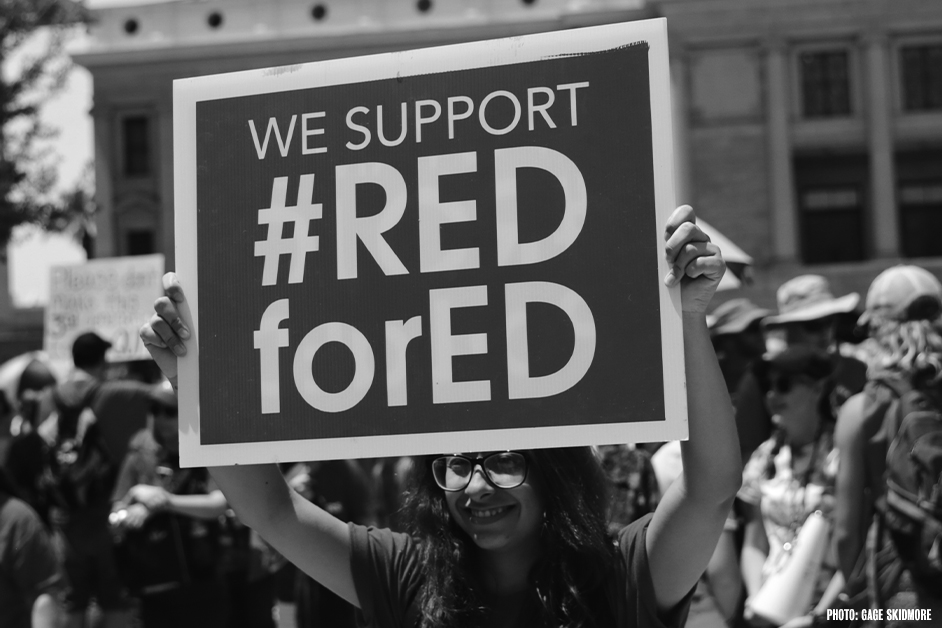The Challenge
Disparate wages and benefits between OHSU staff and executives. Underpaid classified staff at Oregon’s public universities. A gender wage gap at Kroger. And tough contract negotiations at all of them.
Our Approach
During fruitless contract negotiations over the summer of 2019, three Oregon unions turned to Winning Mark to help apply pressure to contract decision-makers. Coordinating timelines with important bargaining deadlines, picketing, and more, we leveraged digital media to target stakeholders, union members and non-members, and the general public to increase awareness around the bigger issues. We used digital tools and amplification to apply pressure to stakeholders, in the hopes of pushing decision makers to agree to a better contract for workers.
The Results
Some of the biggest percentages of increased wages unions have seen in years. Stable and lower health insurance rates, along with expanded coverage. Transportation allotments. Improved vacation policies. Satisfied unions and members.
Lifting up worker voices starts with authentic storytelling.
Fighting to keep unions strong is a core value for us. We have worked with all types of unions, public and private sector, from carpenters, to healthcare, to firefighters, to teachers, and more. And during summer 2019, when our friends at AFSCME 328, SEIU 503, and the Oregon AFL-CIO reached out to us after months of difficult bargaining, we knew just how to amplify their message.
AFSCME Local 328
AFSCME Local 328 represents around 7,000 Oregon Health and Sciences University (OHSU) employees. Their members provide patient care, administrative support, and important behind the scenes work that keep OHSU facilities clean, safe, and running. Negotiations began during spring 2019 after months of submitting proposals, and OHSU executives were attempting to curtail important and hard-won benefits. Union members were being threatened by combining sick days with vacation days, increasing healthcare costs, and developing a tier system calling for different benefits – all while 20 OHSU executives were each earning a salary of over $400,000.
After many months of negotiations, AFSCME Local 328 reached out to us at the end of July to see how they could apply pressure to decision-makers to tip bargaining in their favor, in conjunction with their already impressive grassroots field efforts. In just two short weeks, we produced three videos, each featuring a different union member telling their story with how they would be impacted by the proposed contract changes; we promoted these videos to Facebook and people that listed OHSU as their workplace on LinkedIn, along with geo-fenced the video on pre-roll across the web to visitors at and around the hospital. We also launched a Facebook email campaign to encourage union members, supporters, and the general public to send pressure emails to OHSU executives.
Field efforts combined with the digital media campaign continued to put pressure on high-ranking OHSU stakeholders, and on August 14, a tentative agreement was reached, which includes a 9.25% wage increase over three years and lower-cost health insurance, along with improved vacation and transportation benefits.

SEIU 503
SEIU 503 represents over 4,500 classified staff workers at Oregon’s seven public universities. These workers – who occupy a range of jobs from food workers to transcript specialists – ensure the universities run smoothly for students and other faculty alike. In August 2019, bargaining negotiations were well underway between classified staff and university management. As negotiations were stuck, we worked with SEIU 503 to amplify their field and earned media efforts with a paid digital campaign.
The digital campaign included graphics and videos featuring union members as spokespeople; these ads focused on the integral nature of classified staff and the need for a pay adjustment to keep pace with the rising cost of living. A social video was created outlining management’s attempt to triple the cost of shift meals for the very workers who prepared that food. This video gained traction quickly amongst political influencers and Senator Ron Wyden, ultimately expanding the reach of the campaign even further. Lastly, we launched a radio campaign, which performed especially well in rural communities where digital media has less of an impact and further amplified support for SEIU 503 during their bargaining battle.
This digital approach, combined with a tactful field program and supportive community, helped SEIU 503 come to a tentative agreement in October that included the largest cost-of-living adjustment in more than a decade, narrowly missing the striking deadline SEIU 503 threatened – which would have been the first time the union went to strike in 25 years.
Oregon AFL-CIO
In summer 2019 UFCW Local 555 had been in bargaining efforts that started a year earlier. Among other issues, the union was fighting for pay equity at Kroger -owned Fred Meyer stores. On average, women grocery store workers were making $1.31 an hour less than men. Men were also more likely to be hired for “Schedule A” jobs, which were paid more than “Schedule B” jobs — even though women dominated the workforce at 68%.
In July 2019, we were contacted by the Oregon AFL-CIO, which counts UFCW as one of their affiliates. While not being party to the negotiations, the AFL wanted to launch a permissible public education effort to highlight pay inequity at Fred Meyer. We launched a paid digital media campaign, geo-fencing high-volume Fred Meyers stores in Bend, Salem, Medford, and Portland, along with a high turnout Thorns soccer game and the Kroger central office in Portland. We deployed an email contact campaign to Kroger executives on Facebook; created infographics outlining the wage-gender disparity, earned media, and personal story graphics for AFL-CIO’s social media; and native ads across the web. But, it wasn’t the paid digital efforts alone that turned bargaining around. AFL-CIO’s well-organized and energized field efforts were a key component to raising public awareness.
On October 11, 2019, after 16 months of negotiations, UFCW Local 555 finally ratified a contract, with sizable majority support from union members. The contract included wage increases across the board and 20-hour weekly guarantees, along with improved health benefits – one of the best contracts in memory.
